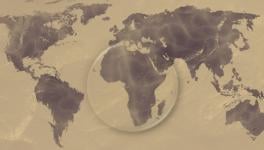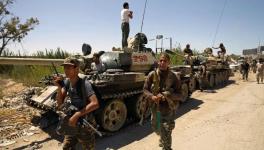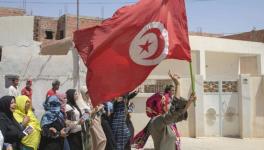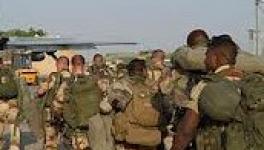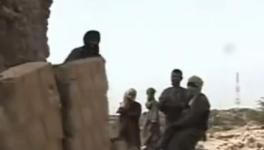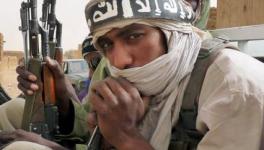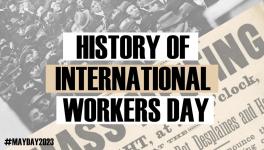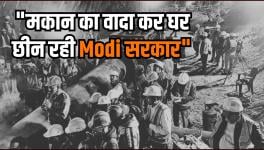Libya and Cote d'Ivoire: Responsibility to Protect or Right to War?
The Libyan military intervention has now taken a toll of thousands. Civilians continue to die as the civil war rages in the country. It matters very little to people if they are killed by artillery fire from Gaddafi's troops or from air strikes of the NATO forces. Only the gullible will believe that NATO smart bombs – unlike Gaddafi's artillery -- only target the military and do not kill civilians.
The US and its allies have openly declared that their goal in Libya now is removal of Gaddafi from power. In other words, regime change. Clearly, he is now a target. His son and grandchildren have been killed in air strikes using the pretext of attacking command and control centres. This would also apply to any important figure in the Libyan government; they can now be designated as a military target and 'taken out'. The US and its allies are mounting air and missile attacks on the Libyan leadership and areas held by the Gaddafi regime, under the guise of protecting civilians. Their sympathies for civilian victims of Gaddafi do not cover African migrant workers fleeing the Libyan civil war. Most of them have been left to fend for themselves and face various forms of racist violence. NATO forces have been complicit in some of these incidents. Guardian has reported that NATO aircraft and an aircraft carrier (most probably Charles De Gaulle), left 61 African migrants to die of hunger and thirst as their ship ran out of fuel, food and water. Despite seeing the plight of the passengers, no help was forthcoming from the NATO forces.The UN is now looking into possible war crimes in Libya committed by the Gaddafi regime. If we look at Cote d'Ivoire, where also the UN is now embroiled in a civil war, the reaction to deaths of innocent civilians is very different. In the same period, according to Red Cross estimates, more than 800 people were executed in one day from Tuesday to Duékoué, Cote d'Ivoire, as part of “sectarian violence”. Quattara's forces, who have been backed by French forces and by the international community, have been directly implicated in this massacre. No enquiry or war crimes is being contemplated here.>Cote d'Ivoire and Libya provide interesting similarities and as well as contrasts. Here also, the west, particularly France has taken the lead within the UN. French and UN forces have backed Quattara's forces against Gbagbo and even provided air cover. Mbeki, the former President of South Africa has written that the pre-condition for the elections did not exist in Cote d'Ivoire and the military control of the north by Quattara's forces decided the elections there. It is the UN backing that legitimised Quattara's 'victory' in the 'disputed' elections and the support of the international community for Quattara.Here again, France was the main mover – it had backed Quattra during the civil war and was strongly opposed to Gbagbo. Gbagbo was advocating that Cote d'Ivoire move out of the Central African currency union through which France exercises a form of neo-colonial control over its ex-colonies in the region. The UN forces, became a party to what was originally Cote d'Ivoire internal dispute and finally backed one side to win.The French role in Cote d'Ivoire as a partisan force and the protector of Quattara was unfortunately under the cover of the UN, as is the Libyan misadventure. Instead of trying to settle a civil war and bring peace to the people of these countries, the UN has been bullied by the major powers to execute their will.Why does France have such an interest in African civil wars? Let us not forget its role in Rwanda, where it played a major role in maintaining a genocidal regime and complicit in its crimes. Mbeki writes, France used its privileged place in the Security Council to position itself to play an important role in determining the future of Côte d'Ivoire, its former colony in which, inter alia, it has significant economic interests. It joined the United Nations to ensure that Ouattara emerged as the victor in the Ivorian conflict.This addressed the national interests of France, consistent with its Françafrique policies, which aim to perpetuate a particular relationship with its former African colonies. This is in keeping with remarks made by former French President François Mitterand when he said, "Without Africa, France will have no history in the 21st century," which former French foreign minister Jacques Godfrain confirmed when he said: "A little country [France], with a small amount of strength, we can move a planet because [of our]...relations with 15 or 20 African countries..."During the Rwandan genocide, Rwanda's current foreign minister, Charles Murigande says, "The French armed the killers and they trained them even when they were saying they were going to kill the Tutsis, and France supported the genocide regime right up until the end, even helping the killers to escape." All of this was to keep its sphere of influence in Francophone Africa. François Mitterand added a particularly racist twist to the Rwandan genocide, claiming, "In such countries, genocide is not too important." The sharp contrast in the response to events in Libya and Cote d'Ivoire brings out how the international community is being asked to follow a script drafted by the western powers to protect their economic and political interests. Let us take the sudden threat of massacre in Benghazi that stampeded the intentional community in supporting the UN Resolution authorising countries to protect civilians in Libya. How real was the threat of massacre?Alan Kuperman has discussed in detail how the myth of massacre was manufactured by Benghazi rebels and the western powers in scant four days, facing as they were impending defeat in Benghazi. Gaddafi in fact had stated that rebels who laid down arms or retreated from Benghazi would not be attacked and threatened only those who would continue fighting. His conduct of in cities his forces had re-taken from the Benghazi rebels also showed no evidence of large scale massacres. Even in the then 3-week long siege of Mishruta, the number of women and children who died in the 257 killed were small. It would have been close to half if there was indeed indiscriminate bombing of the civilian population. Gaddafi may be a brutal dictator, but his conduct in the civil war does not bear out the charge of either mass civilian killings or of genocide. The imperial interest of the US and its allies also become clear if we look at the Benghazi coalition. One of the military chiefs – there are squabbles within the rag tag Benghazi coalition as who is the real number uno in the military hierarchy – is Khalifa Hifter, a former officer in the Libyan armed forces and a known CIA asset for quite some time. As the oil-rich eastern part becomes a western protectorate, it will become increasingly clear what is the game-plan of western powers in Libya.Much of this script that the western powers have drawn up purportedly derives its legitimacy from the Responsibility to Protect (R2P) doctrine provided UN sanction in 2005. Here military intervention is the last resort after all other forms have failed and only in case of “genocide, war crimes, ethnic cleansing and crimes against humanity.” It is difficult to see how a Libyan civil war squares up to any of the criteria laid down under R2P doctrine. Or how the military intervention was the only course left after everything else had been tried first. Instead, we have today is a trigger happy coalition, using the R2P doctrine as a tool for its neo-colonial expansion.If we look back at the Libyan military intervention, the similarity to Iraq war becomes eerily similar. In both cases, a myth is first manufactured and then the international community is asked to support the action decided by Washington and its allies. The presidents have changed, but the objective and modus operandi have not. For Sarkozy, the war is nothing but a cynical strategy to bolster his sagging fortunes in the impending French elections. There is nothing that helps the ratings as a small war. Remember Grenada and Panama? Remember Falkland Islands?The problem for the western powers is having got into Libya, getting out is not going to be easy. They can try and take out Gaddafi, induct in military 'advisers', even put boots on the ground, all forbidden by the UN Resolution under which umbrella they are operating. All of these actions will not help leave behind a functional state of Libya. And failed states tend to provide their own blow back. Unfortunately, the Libyan people, the migrant workers and others in Africa will bear the major brunt of this new Libyan misadventure. This is the real tragedy – those who cause the problem suffer minimally from its consequences. It is the innocent who always suffer the most.
photograph courtesy: flickr.com
Get the latest reports & analysis with people's perspective on Protests, movements & deep analytical videos, discussions of the current affairs in your Telegram app. Subscribe to NewsClick's Telegram channel & get Real-Time updates on stories, as they get published on our website.









